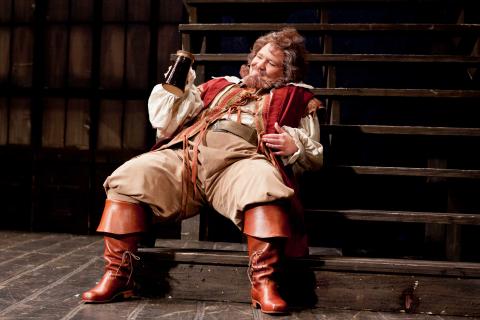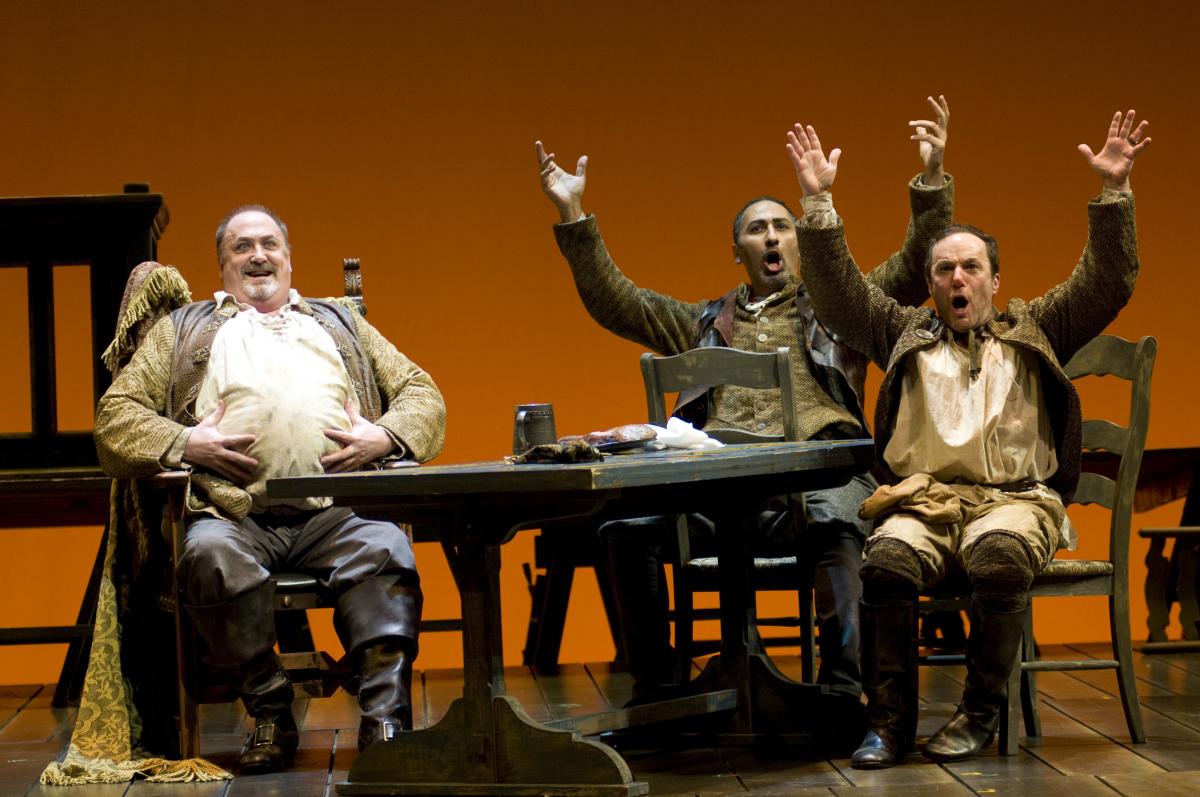Falstaff

Falstaff is the Central character of the plays of William Shakespeare: a historical chronicle "Henry IV" and Comedy "Windsor scoffer" (1597). One of the most popular comic characters of Shakespeare. In the image of his hero, the playwright, "combined" the two real historical persons. It was sir John Oldcastle, Lord Cobam who, despite his noble origins, to the sect of Lollards (the forerunners of the puritans), speaking with diatribes against Catholic churches and burned for heresy in 1417. Another prototype F. Baronet John Fastolf, a contemporary and colleague of Henry V, brave warrior for the only time in life manifested a lack of courage and fleeing from the battlefield at the pate, it was stripped of all military ranks.
Shakespeare, in this case, completely away from both the historical prototypes, making the two quite decent people in the old jester, a glutton and a slacker. However, as the story goes and writes the first biographer of Shakespeare, N. Rau, after the submission of Henry IV Queen Elizabeth so admired admirable character what was told to bring him in another play. This "social order" is largely due to the urgency with which after a historical chronicle appeared Comedy.
Giving your hero, on the one hand, features of the allegorical character of the medieval English morality play of Vice, and on the other some signs type "boastful soldier", the Roman, Shakespeare nevertheless created a completely original way, attractive, irresistible full evil charm and at the same time repulsive. In F. attracted to his internal looseness, mockingly skeptical of any kind of dogma, the mind and endless sense of humor that allows him everyone to laugh at himself.

His jokes, antics sometimes truly creative and artistic. No wonder the clever Prince Harry (becoming in the second part of Henry IV king Henry), in such a friendly manner communicate with him, finding in F. independence of judgment and mockingly cynical mind coupled with a gaiety of temper and his constant willingness to all kinds of mischief. His position in the company of the Prince, however, is twofold: on the one hand, the other (F., after all, a nobleman, impoverished knight), the other a sort of buffoon. Despite his years, F. extremely agile, and his complaints of feeling unwell nothing like a game, a kind of flirting, a way to attract the attention of others. Is he even a natural born comedian, able to adapt to any situation, wearing any disguise, and any situation to extract the maximum fun for themselves.
The tendency to eat well and drink related Panoram F. Rabelais, and the constant readiness of imagination, the most improbable, but expounded to them calmly and constant resourcefulness, partly anticipates the famous Baron Munchausen. However, the disadvantages the essence of the continuation of its merits. His inner freedom turns into the freedom for himself, his humor is cynical, Rabelaisian breadth elementary drunkenness and gluttony. He may be dishonest, insincere words and dishonest actions. It is a mockery of morality turns into amorality. F., thus, it is quite the Renaissance figure, Epicureanism and free-thinking, and at the same time, it is clearly visible features of the crisis of Renaissance harmony.
This development of the image F. especially noticeable when comparing its first "appearance" in "Henry IV" and second in "Windsor": he seemed to gradually "fade" from the pen of its Creator, paint fade, jokes are repeated, it becomes uninteresting and boring. Thanks to the hero of Shakespeare, the expression "spirit" became a household word to refer to the unrestrained gaiety, irrepressible optimism, endless creativity, of praising life, "triumph of flesh". Among the foreign performers of the role, it should be noted T. Betterton, F. Schroeder, W. Degelman ("Henry IV" directed by M. Reinhardt, 1912, in the role of Prince Harry A. Moissi).
In 1893, on a libretto by A. Boito Opera was written by John. Verdi's "Falstaff". F. Verdi's credo: "Everything in the world is a joke!" And neither is life. Image F. overcoming the bitter realization of old age by Verdi, with his creation, as a living person. Here is the inscription on the score of the Opera: "come, Come, old John, Go your way, how you will allow. It's all over. Funny kind of cheat, ever living under different masks, everywhere and anywhere. Go, go, go, go!" The first performer of the party F. at the premiere of the Opera at the theatre "La Scala" was V. Morel.
